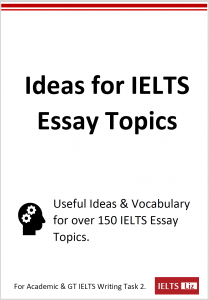Below is a model IELTS writing task 2 answer for an essay question reported in the IELTS test this month. The question was reported in the test on March 3rd.
You will also find on this page:
- a link to learn plastic bag facts
- useful vocabulary for this topic
IELTS Essay Question March 2018
In many countries plastic shopping bags are the main source of rubbish, causing pollution on land and in the water, so people think they should be banned. To what extent do you agree or disagree?
IELTS Model Essay March 2018
Some people think that plastic shopping bags should be prohibited because they are one of the major pollutants of both land and water around the world. I completely agree, but I think there are other measures that can be taken before putting a complete ban in place.
The reason that plastic bags should be banned in the near future is because they do not biodegrade and continue to pollute the environment for hundreds of years after being discarded. Plastic bags are often used only once, and end up clogging the land and polluting the water, causing about 100,000 marine animal deaths each year. Even when plastic does start to break down, it fragments into micro plastic which causes even more damage to all life on Earth. The only way to prevent throw-away plastic, such as plastic shopping bags, from seriously and irreversibly damaging our planet is to prohibit it.
However, it is best to try to change consumer behaviour before completely banning plastic bags. Plastic bags are not a vitally, necessary plastic product, only a convenience and customers should learn to replace them by using bags from home. Another step to deterring people from using so many plastic bags is by putting a high price on them which will encourage people to reuse them. Finally, having recycle bins by which customers can get cash back for depositing used plastic bags will also help. By altering consumer behaviour, it is a good way of raising awareness of plastic pollution as a whole and this can lead to more action on other unnecessary plastic products in the future.
In conclusion, an eventual total ban on plastic bags is crucial to preserve life on this planet and protect it from the effects of throw away non-biodegradable products.
Word count – 295
Plastic Bag Facts
Learn 7 amazing facts about plastic bags on this page: Plastic Bag Facts
Useful language List
- ban / prohibit
- discard
- biodegradable / non-biodegradable
- fragment
- micro plastic
- throw away products
- marine life / marine animal
- irreversibly damage
- pollutant
- consumer behaviour
- deter
- recycle bins
- cash back
- preserve life
It is also possible to agree with one side only. See other essays posted by students for this essay question – Other Student Essays





